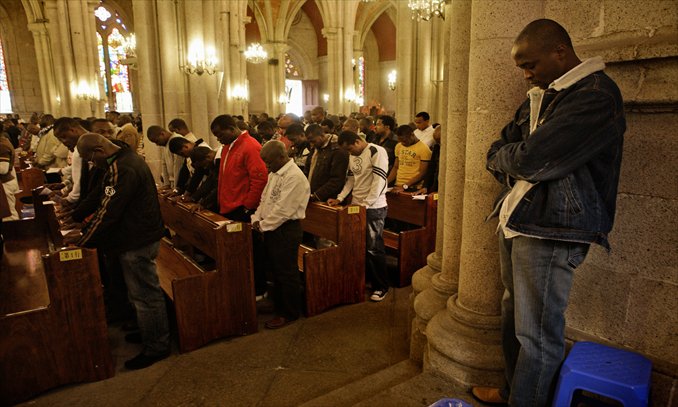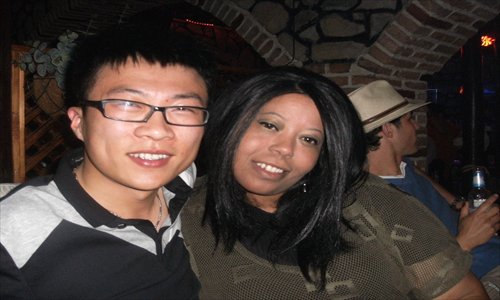Colors of love

Every week her letterbox has requests from other black women, asking how she managed her marriage with her Chinese husband. She always cautions them there is no safety net in life. Sometime you break a bone, sometime you break a heart, and sometime you have to break a taboo in a country where residual racism means many families frown on the idea of bringing a black member into a family.
After living in China for four years, Jo Gan, an African-American woman who married Michael Gan, said that one of the biggest oddities she has found is the lack of Black-Asian couples, even in the big city.
"One of the reasons for this comes from media stereotypes that portray black women as difficult to control, oversexed, larger and not attractive due to skin color and body shape," she said.
When she asked young Chinese men what they think about black women, many smiled and said they prefer white women, but black women with whiter skin are OK. They can "try one for fun."
"With so many single men in China searching for wives and a huge population of single black women around the globe, it would make so much sense for these two people to get together and become a powerful couple," Gan added.

She is a living proof that romantic alliances sometimes overwhelm bias. But the loss of face involved in dating or marrying a black partner still weighs heavily on many families. And local prejudices can take bizarre turns. One mother from Hunan Province stated that she believed her grandchildren would look like "giraffes" if her daughter married an African.
If you ask people in China about racism, many will tell you racism doesn't exist in China and they respect people of all countries and colors. Chinese media coverage of racism is generally shallow and focused only on the US experience. But if you dig deeper and ask what they think of black people, they will say: "I am not racist but . . ."
Non-white foreigners, especially black people, are likely to face more obstacles in China as many Chinese see them as inferior.
"No one in the world today would admit they are racist against anyone," Cheng Yinghong, associate professor of history at Delaware State University in the US, told the Global Times. "What often betrays their racist bias against certain ethnic groups is they explain socio-economic achievements or failures by finding the answer in the culture of the group, so much so that culture is essentially used as an alternative to 'race'."
Sultane Barry, president of the Association of Guineans in China, told the Global Times that he believes the root of the ongoing racism the African migrants suffer is the attitude of African leaders.
"As long as African governments keep on begging, there is no way they can stand up to anybody and defend the rights of their citizens anywhere," he said. "More awareness by Africans themselves is needed here."
"This makes it impossible for Africa and Africans to have any respect anywhere, not only in China," he said.
"The only image of Africa being shown in the media is that of a continent where people die of AIDS, hunger, war and all the ills you can imagine. This is the image that has to change, if Africans expect to be respected," he continued.
"One white patch"
One Chinese girl who is studying in the US and has an African-American boyfriend recently posted her experiences and arguments with her family on her blog, saying her mother worries about her safety because she believes that black people tend to be dangerous.
Ironically, her family, who she said have never talked to a black person accept her cousin's white boyfriend, but refuse to accept hers.
"They just made all of these bad assumptions about black people based on what the media tell them, which is really unfair!" she wrote.
Many Chinese people cannot recognize the diversity and range of cultures among "black" people. For instance, they often confuse Africans and African-Americans and know little about African countries. Jo Gan said it annoys her when Chinese people lump them into the same group.
"First they don't understand why I am called Black when my skin is brown and I sometimes get mistaken for African, but I clear it up and tell them it is the same as if I called you Korean. Then they understand," she said.
She added that she had difficulties finding a teaching job in Chinese schools because of her skin color. Some well-known language schools reportedly prefer white teachers because they look "professional," and many ask prospective teachers to send a photo in order to surreptitiously tell their color.
An old saying "one white patch covers up a thousand defects" describes the Chinese preference for lighter skin. Chinese people believe lighter skin is associated with beauty and prosperity, because it was associated with having the wealth and status to remain inside rather than labor in the fields.
Many Chinese people are obsessed with getting white skin. Beach goers in Qingdao wearing "facekinis" covering the entire head, face and neck and reaching down to the collarbone, to prevent tanning recently made the international papers.
In 2009, a Shanghai TV talent show provoked a debate on racism in the Chinese media. Lou Jing, the 20-year-old daughter of a Chinese mother and an African-American father who left the country before she was born, one of the five finalists, drew a barrage of Internet abuse because she is "black".
Internet users criticized her, saying "yellow and black mixed is very gross" and "it's shameless for her to appear on TV."
Lou told the media that the level of hostility shocked her and it was a "big bomb" to her family.
"I think the most powerful yet often hidden cause of racial discriminations in China is the traditional Sino-centric view of the world and the belief in Chinese uniqueness," said professor Cheng.
To avoid the extra attention, Gan said she and her Chinese husband just live their lives. "Like the Chinese expression, walk your way, let others say," she said.
Chocolate city
Guangzhou, the capital of South China's Guangdong Province, home to approximately 200,000 African migrants, about 2 percent of the city's population, has become known as "chocolate city." The number of African immigrants has been growing at 30-40 percent annually, according to official statistics.
The newcomers are mainly from Nigeria, Guinea, Cameroon, Liberia and Mali, living in village-districts in the city and doing business in a few large China-Africa commerce malls. People from the community said they are increasingly frustrated at the racial discrimination towards them.
"For example, a taxi will only stop if there are no people of other colors around. The 'black' man will be the last person to get a taxi," said Sultane Barry.
"When we come into communities where we are openly considered inferior, this makes life very difficult. Even our kids going to school in China rarely make any Chinese friends among their classmates," he continued.
They often hear Chinese people calling them "black ghost" or "crazy black guy" publicly and laughing at them. But some Chinese explain that the unpleasant experience also happen to other outsiders in China.
"The development within China is so unbalanced and quite different for different areas. Unpleasant people or things definitely exist in China, even I experience such things every day," Li Chen, an intern at China office of the United Nations Development Programme in Beijing, told the Global Times.
The African community refuses to take discrimination lying down. Back in the late 1980s, Africans were already protesting racism in China. In 1985, some Chinese and African students reportedly clashed at Tianjin University. Later in 1987, some 200 African students reportedly marched through Beijing to protest racism and urged Chinese officials to ensure dignity and security for them.
Now, after two decades, China has become Africa's biggest trading partner. And the China-Africa Development Fund is about to invest $2 billion in Sino-Africa cooperation projects, the Xinhua News Agency quoted the China Development Bank as saying in July.
However, the chocolate city still sees conflicts between Chinese and Africans. Earlier in June this year, some 100 Africans protested over a Nigerian businessman died in police custody in Guangzhou.
The man was taken to the police station following a fight over a disputed fare with the driver of an electric bicycle. Later he lost consciousness and died after receiving medical treatment at the station, according to the police.
Xinhua quoted some African experts as saying "China, as a true friend of Africa, has provided sincere and unconditional aid for the continent by improving infrastructure and pouring investment."
Meanwhile, many Chinese industries are reliant upon African resources, while others are looking to the continent's growing markets and prosperous middle class. Sino-African trade reached a record high to $166.3 billion in 2011, a year-on-year increase of more than 30 percent.
However, Professor Adams Bodomo at the University of Hong Kong and author of Africans in China, told the Global Times that "the way the discourse about 'aid' goes between African and Chinese leaders makes some Chinese feel a sense of resentment towards Africans."
Li Chen suggests that the Chinese government should pass relevant legislation concerning immigration issues to solve the problem. "As the economic development and education covers more and more of the population, fewer Chinese will judge people by their skin color," he said.
Or simply be yourself, as Jo Gan tells her black sisters. "Prove the stereotypes wrong and get out there and talk to Chinese men and show them that black women can be intelligent, beautiful and respectful. Show them that black women are not only supportive but motivating, family-oriented and loving," she said.